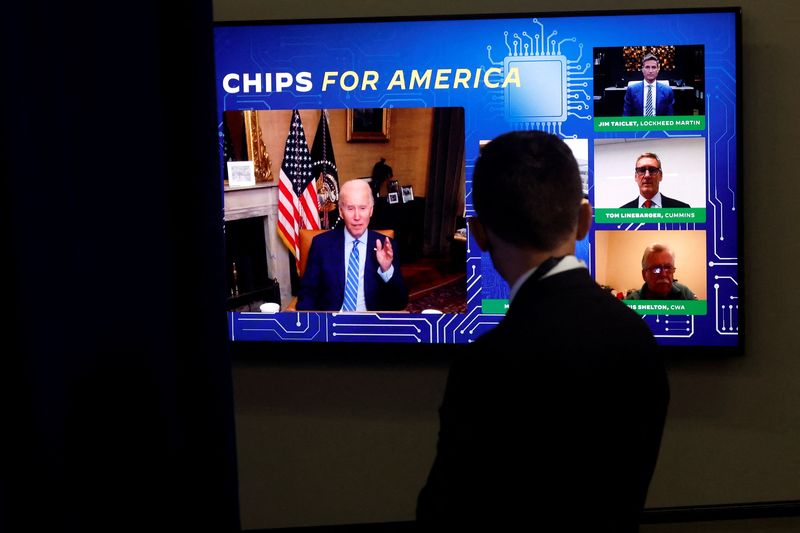
© Reuters. FILE PHOTO: A White House press aide looks on as U.S. President Joe Biden, isolating following his COVID-19 diagnosis, appears virtually in a meeting with business and labor leaders about the Chips Act — relating to U.S. domestic chip and semiconductor
(Reuters) -The United States has spoken with its partners, including Japan and the Netherlands, on tightening exports to China of equipment used to make semiconductors, Jake Sullivan, the White House national security adviser, said on Monday.
The Biden administration aims to cut China off from certain semiconductor chips made anywhere in the world with U.S. equipment, in a bid to slow Beijing’s technological and military advances, issuing a series of curbs in October.
Sullivan’s comments followed a report by Bloomberg News that the two countries had agreed in principle to join the U.S.-led technology export control, citing people familiar with the matter.
Asked about the report, Japanese Trade Minister Yasutoshi Nishimura said co-operation in export control figured in a telephone conversation he had with U.S. Commerce Secretary Gina Raimondo, but declined to elaborate.
“I cannot go into details as they are diplomatic exchanges, but Japan has been implementing its export control strictly, based on the foreign exchange and foreign trade law in the spirit of international co-operation,” he told reporters.
A spokesperson for the Dutch foreign ministry declined to comment. Trade Minister Liesje Schreinemacher has said the Netherlands is in talks with the U.S. on restrictions.
Apart from top U.S. gear suppliers, Japan’s Tokyo Electron Ltd and Dutch lithography specialist ASML Holding (NASDAQ:) NV are companies that make equipment needed to make highly advanced chips, and their governments’ adoption of the curbs would mark a major shift in the industry.
In October, U.S. administration officials said they expected to reach a deal with allies on curbing exports ‘in the near term”.
The Dutch government has restricted ASML from shipping its most advanced equipment to China since 2019, but curbs announced by the U.S. in October go further. ASML declined to comment.
A spokesperson for Tokyo Electron said the company was in no position to respond, since the matter had to do with each country’s regulations.
“We intend to keep a close eye on the situation constantly and deal with it appropriately,” the spokesperson added.
China is Tokyo Electron’s largest market, accounting for 26% of its sales of 1.94 trillion yen ($14.1 billion) in chip-making equipment for the year that ended in March.
For Japanese chip-testing equipment maker Advantest Corp, China is the second-largest market, after Taiwan. Orders of 189 billion yen came in from China in the previous business year, or 27% of its total.
ASML said in November that its financial outlook through 2030 would not be impacted by a total ban on equipment sales to China. The company, which cannot currently meet demand, could sell the 15% of its order backlog currently destined for Chinese customers elsewhere.
In another development underlining ties between Tokyo and Washington, IBM (NYSE:) Corp and Rapidus, a newly formed chip maker backed by Japan, unveiled a partnership on Tuesday that aims to make the world’s most advanced chips in Japan by the second half of the decade.
Dario Gil, the U.S. firm’s research director, said the two companies would work together to make IBM’s 2-nanometer-node chips, unveiled last year.
($1=137.5500 yen)





